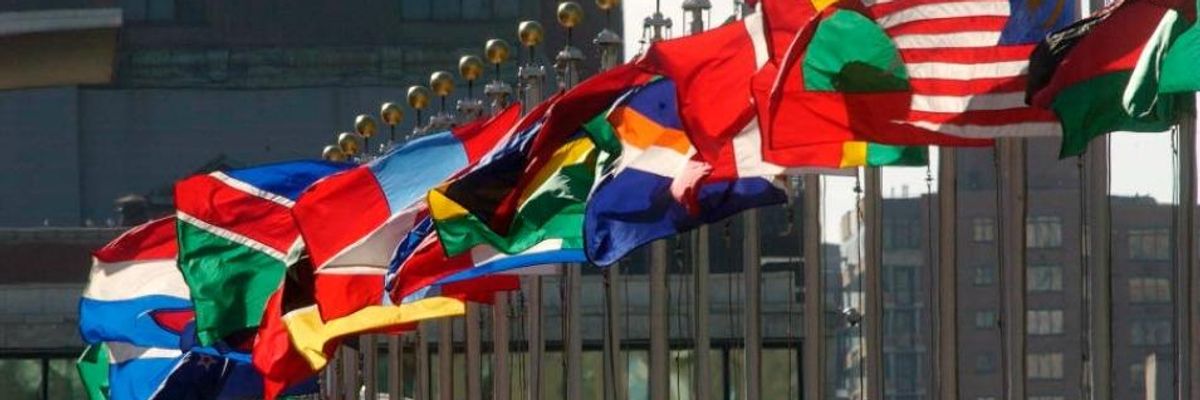The United Nations General Assembly on Thursday evening approved its first resolution on the global coronavirus outbreak, calling for "intensified international cooperation to contain, mitigate, and defeat the pandemic" that has now killed over 55,000 people and infected more than one million worldwide.
"Clearly, we must fight the virus for all of humanity, with a focus on people, especially the most affected: women, older people, youth, low-wage workers, small and medium enterprises, the informal sector, and vulnerable groups."
--U.N. Secretary-General Antonio Guterres
The resolution (pdf), titled "Global Solidarity to Fight the Coronavirus Disease (COVID-19)," encourages all countries to tackle the crisis by "exchanging information, scientific knowledge, and best practices, and by applying the relevant guidelines recommended by the World Health Organization," a specialized U.N. agency.
The COVID-19 outbreak is a "threat to human health, safety, and well-being," the resolution states, recognizing "the unprecedented effects of the pandemic, including the severe disruption to societies and economies, as well as to global travel and commerce, and the devastating impact on the livelihood of people."
"The poorest and most vulnerable are the hardest hit by the pandemic," warns the document, "and that the impact of the crisis will reverse hard-won development gains and hamper progress towards achieving the Sustainable Development Goals."
The resolution "emphasizes the need for full respect for human rights, and stresses that there is no place for any form of discrimination, racism, and xenophobia in the response to the pandemic." It also recognizes the efforts of frontline workers and governments to address the crisis.
Sponsored by Ghana, Indonesia, Liechtenstein, Norway, Singapore, and Switzerland, the approved resolution was formally backed by 188 of the U.N. body's 193 members.
In response to the virus outbreak, the General Assembly has temporarily shifted to a "silence procedure" for passing resolutions; rather than meeting and voting to adopt a resolution by a majority or consensus, resolutions now pass as long as none of the member nations object before set deadlines.
The General Assembly declined to pass a rival coronavirus resolution sponsored by Russia. The New York Times reported that "diplomats said the European Union, United Kingdom, United States, and Ukraine objected to the Russian draft, which was co-sponsored by Central African Republic, Cuba, Nicaragua, and Venezuela."
In addition to calling for a global response to the coronavirus "based on unity, solidarity, and renewed multilateral cooperation," the approved resolution "calls upon the United Nations system, under the leadership of the secretary-general, to work with all relevant actors in order to mobilize a coordinated global response to the pandemic and its adverse social, economic, and financial impact on all societies."
The resolution was adopted mere hours after U.N. Secretary-General Antonio Guterres published an op-ed about the pandemic in the Guardian, arguing that "we are still far away from having a coordinated, articulated global response that meets the unprecedented magnitude of what we are facing."
Guterres outlined a three-point call to action "based on science, solidarity, and smart policies":
- Suppress transmission of the coronavirus;
- Tackle the devastating social and economic dimensions of the crisis; and
- Recover better.
The U.N. chief also highlighted the importance of "aggressive and early testing and contact tracing, complemented by quarantines, treatment, and measures to keep first responders safe, combined with measures to restrict movement and contact."
"The virus is spreading like wildfire, and is likely to move swiftly into the global south, where health systems face constraints, people are more vulnerable, and millions live in densely populated slums or crowded settlements for refugees and internally displaced persons," he warned. "Clearly, we must fight the virus for all of humanity, with a focus on people, especially the most affected: women, older people, youth, low-wage workers, small and medium enterprises, the informal sector, and vulnerable groups."
Regarding long-term recovery efforts, Guterres wrote that "we simply cannot return to where we were before COVID-19 struck, with societies unnecessarily vulnerable to crisis. The pandemic has reminded us, in the starkest way possible, of the price we pay for weaknesses in health systems, social protections, and public services. It has underscored and exacerbated inequalities."
"Now is the time to redouble our efforts to build more inclusive and sustainable economies and societies that are more resilient in the face of pandemics, climate change, and other global challenges," he added. "The recovery must lead to a different economy. Our roadmap remains the 2030 agenda and Sustainable Development Goals."




